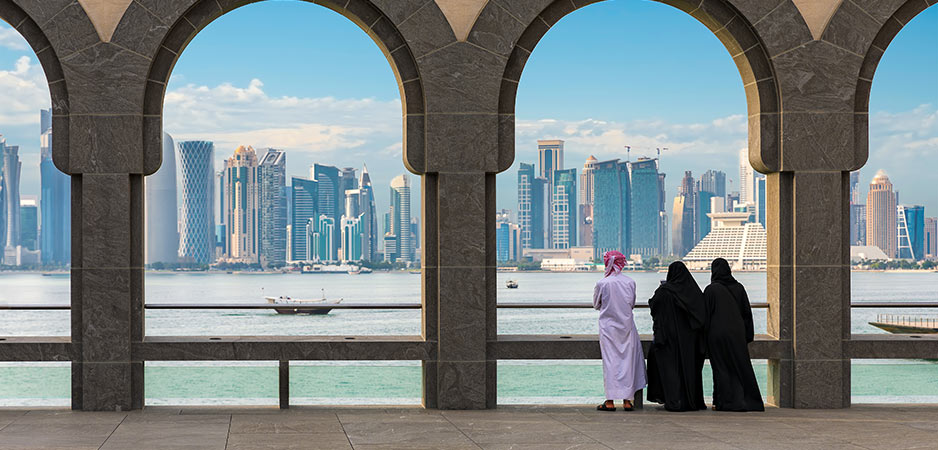Since 2017, the blockade of Qatar has continued to have a profound impact on the country. Transportation routes have been disrupted, supply chains have been altered, and family and friends remain separated. In response, the Gulf state has deployed various legal mechanisms to resolve the ongoing regional dispute and help reintroduce a sense of normalcy for its residents.
Sovereignty: International Courts and Tribunals
Sovereignty is a legal concept that expresses the power of a country participating in the international system to exercise great and perpetual authority over its territory. To uphold this, the post-war international legal order created a variety of institutions for the resolution of disputes among nations. These range from “traditional” practices to a multiplicity of international courts and tribunals, each operating within their own specialized regime. In response to the economic and diplomatic, Qatar has used both to exercise effective control over its territory.
From an international law perspective, Qatar’s sovereignty has been expressed through the initiation of legal action against the blockading countries: Saudi Arabia, Bahrain, the United Arab Emirates and Egypt. In doing so, Qatar has chosen a strategy of filing multiple claims before various international courts and tribunals. These include the International Court of Justice (ICJ), the World Trade Organization (WTO), the International Civil Aviation Organization (ICAO) and other fora.
Based in The Hague, the ICJ is the principal judicial organ of the United Nations and, as such, at the epicenter of the international legal order. Still, the court does not have mandatory jurisdiction over all disputes arising between two or more states. Rather, according to the ICJ Statute, states must have a concrete legal basis to introduce a case.
In June 2018, Qatar instituted proceedings against the United Arab Emirates in the ICJ under the International Convention on the Elimination of All Forms of Racial Discrimination (CERD). In doing so, Qatar requested the court to order provisional measures to protect Qatari citizens expelled from the UAE after the commencement of the blockade in June 2017.
On July 23, 2018, the ICJ issued its order on provisional measures requiring the UAE to: (1) allow families with mixed nationalities to be reunited; (2) give Qatari students in the UAE affected by the measures the opportunity to complete their education or obtain their educational records if they wish to continue studies elsewhere; and (3) grant Qataris access to tribunals and other judicial institutions. After this ruling, the UAE filed its own request for provisional measures relating to actions that Qatar had filed before the United Nations’ CERD committee and elsewhere. On June 14, 2019, the ICJ denied the UAE’s request for provisional measures. A date for a hearing on the merits of the Qatar v. UAE case has not yet been set.
In addition, the blockading countries have brought forward a separate action in the ICJ under Article 84 of the Convention on International Civil Aviation regarding a decision of the council of the ICAO, challenging their closure of airspace to Qatari traffic. In June 2018, the council issued a ruling that was largely in favor of Qatar’s complaint. The public hearings in the blockading states’ appeal of the ICAO decision were held before the ICJ in December 2019 and a final decision is pending.
Sovereignty: Other Means to Peaceful Resolution
Apart from courts and tribunals, international law provides for a category of dispute settlement methods that include mediation, together with negotiation, conciliation and inquiry. These means of peaceful settlement of international disputes are mentioned under Article 33 of the UN Charter.
Mediation involves the participation of a third party with the aim of helping parties to the dispute come to a commonly agreed solution. Given the nature and rather informal character of the mediation process, it is exclusively up to the disputing parties to resolve the dispute. To assist, Kuwait has played a visible role in trying to mediate a solution to the blockade and recently reiterated its commitment to do so.
Qatar has also taken multiple steps to protect the rights of its citizens at the political, diplomatic and legal levels. At the level of politics and diplomacy, there are two possible approaches: bilateral and multilateral. Bilateral action involves engaging in direct dialogue with the governments of the blockading countries. The state of Qatar can also raise issues before the relevant multilateral international political fora, such as the institutions of the Gulf Cooperation Council and the UN General Assembly. In this respect, Emir Sheikh Tamim bin Hamad Al Thani raised the issue of the blockade before the General Assembly, most recently at its opening session on September 24, 2019.
Initially a political crisis, the blockade against Qatar has been increasingly played out over multiple legal disputes. The hope is that the law will also provide a bridge for the resolution of the political issues.
*[Dr. George Dimitropoulos is an associate professor at the College of Law at Hamad Bin Khalifa University in Qatar. The views expressed are the author’s own and do not necessarily reflect the university’s official stance.]
The views expressed in this article are the author’s own and do not necessarily reflect Fair Observer’s editorial policy.
Support Fair Observer
We rely on your support for our independence, diversity and quality.
For more than 10 years, Fair Observer has been free, fair and independent. No billionaire owns us, no advertisers control us. We are a reader-supported nonprofit. Unlike many other publications, we keep our content free for readers regardless of where they live or whether they can afford to pay. We have no paywalls and no ads.
In the post-truth era of fake news, echo chambers and filter bubbles, we publish a plurality of perspectives from around the world. Anyone can publish with us, but everyone goes through a rigorous editorial process. So, you get fact-checked, well-reasoned content instead of noise.
We publish 2,500+ voices from 90+ countries. We also conduct education and training programs
on subjects ranging from digital media and journalism to writing and critical thinking. This
doesn’t come cheap. Servers, editors, trainers and web developers cost
money.
Please consider supporting us on a regular basis as a recurring donor or a
sustaining member.
Will you support FO’s journalism?
We rely on your support for our independence, diversity and quality.






